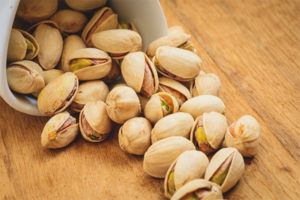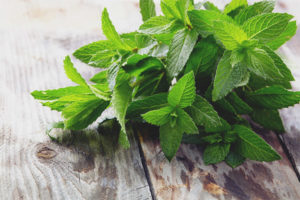The content of the article
During pregnancy, a woman brews medicinal herbs more and more often, as chemical preparations can harm a baby.
Drugstores offer a variety of vegetable fees that help overcome insomnia, reduce the signs of toxemia, get rid of edema, and even eliminate mood swings. In this regard, medicinal melissa can give odds to other herbs - it is not only very useful for mother and baby, but also really tasty.
Melissa teas have long been used to treat various diseases and to make you feel better during pregnancy. However, before starting phytotherapy it is necessary to familiarize yourself with possible limitations and contraindications.
Chemical composition
Fragrant lemon mint is a valuable source of beneficial ingredients:
- B vitamins, ascorbic acid;
- essential oils;
- coumarins;
- useful resins;
- bitterness;
- flavonoids;
- tanning components;
- organic acids (caffeic, rosemary, chlorogenic, etc.);
- monotherapy;
- phenylpropanoids;
- phytosterols (vegetable analogues of female sex hormones);
- phenol carboxylic acids (salicylic, vanillic, lilac and others);
- myrcene;
- linalool;
- saponins;
- ursolic acid;
- carotenoids.
Macro and trace elements (potassium, nickel, magnesium, chromium, calcium, zinc, vanadium, iron, molybdenum, manganese, and many others).
The composition of tea with melissa is surprising, because we hear many names for the first time. But it is thanks to rare compounds that the grass gently affects the organisms of the mother and child, strengthens them.
Valuable esters have a positive effect on overall well-being and psycho-emotional state. Tea with melissa soothes, reduces anxiety and irritability, helps to fight depression and apathy.
Phenylpropanoids are natural immunomodulators that strengthen the body's defenses. They also act as antioxidants, protecting cells from acidic reactions and prolonging their youth.Phenylpropanoids affect the functioning of the liver and protect the body from excessive load as the uterus grows.
Tannins stop inflammation and promote blood clotting, preventing blood loss during childbirth.
Flavonoids produce an antimicrobial effect, protecting mom and baby from pathogenic microflora.
Coumarins produce neoplasm prophylaxis (polyps, cysts, abscesses, fibroids and oncology).
Saponins cleanse the body due to its mild diuretic, laxative and choleretic effect. They also normalize digestion and sleep, have sedative properties.
What is useful tea from lemon balm pregnant
The healing plant demonstrates the following medicinal properties for the mother and child.
- Affects hemostasis, providing normal blood clotting.
- Reduces pain, cramps, headaches and migraines.
- Contributes to the weakening of muscle tone, including uterine.
- It soothes the nervous system and psyche, relaxes, provides rapid sleep and prolonged deep sleep.
- It helps the body more effectively fight viruses, infections and bacteria.Produces prevention of influenza and other colds.
- Positive effect on the respiratory system, clears the naso-and oropharynx from mucus in asthma, rhinitis, bronchitis.
- Provides good digestion and intestinal motility, facilitates the absorption of beneficial components. It is believed that melissa tea reduces the signs of toxicosis: nausea and vomiting, diarrhea, weakness. It also enhances the appetite, which allows the expectant mother in the first trimester to fully eat.
- Helps relieve chronic constipation on the 2nd and 3rd trimester due to its mild laxative effect.
- Accelerates the production of hemoglobin, which transports oxygen to the cells.
- It accelerates the metabolism, providing the mother and baby with the necessary energy and vigor.
- It alleviates mood swings in the first trimester, eliminates fears, irritability and irritability due to copper in its composition.
- Promotes healing of mucous membranes with colds, as well as dental problems (eg, candidiasis, periodontal disease, stomatitis or glossitis). Tannins provide fast tissue regeneration.
- Helps to reduce itching of the epidermis in various dermatitis (including allergic nature).
- Removes excess fluid from the body, which helps eliminate puffiness.
- Gently reduces pressure, which helps the expectant mother to deal with hypertension and produces eclampsia prevention.
- It cleanses the body of poisons, metabolic products, radionuclides, "bad" cholesterol, salts, free radicals.
- It is a natural lactogonic agent that stimulates the production of milk after childbirth.
Features of drinking tea with melissa
First of all, the expectant mother needs to properly collect the medicinal herb. It is believed that the greatest concentration of esters is achieved during its flowering period. The plant can be grown in your garden, as well as in the apartment (lemon balm grows well in a pot on the windowsill).
In winter, fresh lemon balm is hard to get, so the expectant mother can use a dry pharmaceutical collection or herbal essential oil.
Before brewing, fresh leaves are well washed and dried, and dry leaves are ground.
Tea can be brewed only from lemon balm or in combination with green or black tea leaves.For treatment during pregnancy, the plant is combined with mint, strawberry and currant leaves, lemon, thyme.
For the preparation of medicinal tea 2 tablespoons of crushed plants need to pour 300 ml of boiling water. Healing broth is brewed in a thermos for 10 minutes. The resulting beverage is diluted with water 1 to 1.
If tea from lemon balm is used before bedtime, then it should be weak and with the addition of honey.
Are there health risks
Each medicinal herb has side effects and contraindications.
- Melissa contains extracts and ethers, as well as vitamin C, which are strong allergens. At the same time, a pregnant reaction may not occur, and the child may develop a food allergy and even atopic dermatitis in the future.
- It is necessary to consider that the herb has a diuretic effect. That is why it is not used by people with kidney diseases (for example, pyelonephritis, glomerulonephritis) and the urogenital system, as well as in the presence of stones.
- The laxative effect makes it unacceptable to use lemon balm tea during the period of exacerbation of diarrhea.
- Also, some doctors believe that lemon balm increases the production of female sex hormones,and this can disrupt the endocrine system and adversely affect pregnancy (for example, improve the tone of the uterus).
- Abuse of tea can lead to excessive sedation and a decrease in the tone of the vascular walls. As a result, the expectant mother complains of headaches or migraines, dizziness, numbness of the extremities, and general malaise.
Contraindications to the therapeutic drink made of lemon balm are the following:
- hypotension and vegetovascular disorders;
- exacerbations of diseases of the gastrointestinal tract (gastritis, ulcers, colitis, acidity);
- diseases of internal organs (liver, kidney, pancreas, gall bladder, etc.);
- allergic to medicinal herbs in history.
Fragrant and tasty melissa helps the expectant mother to calm down and relax, comfortably expect the appearance of the long-awaited baby. On the day, one mug of a weak drink is enough to improve the nervous system, alleviate the symptoms of toxemia and normalize sleep.
Video: useful properties of lemon balm











To send